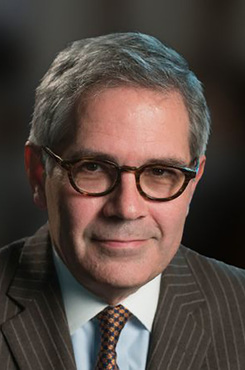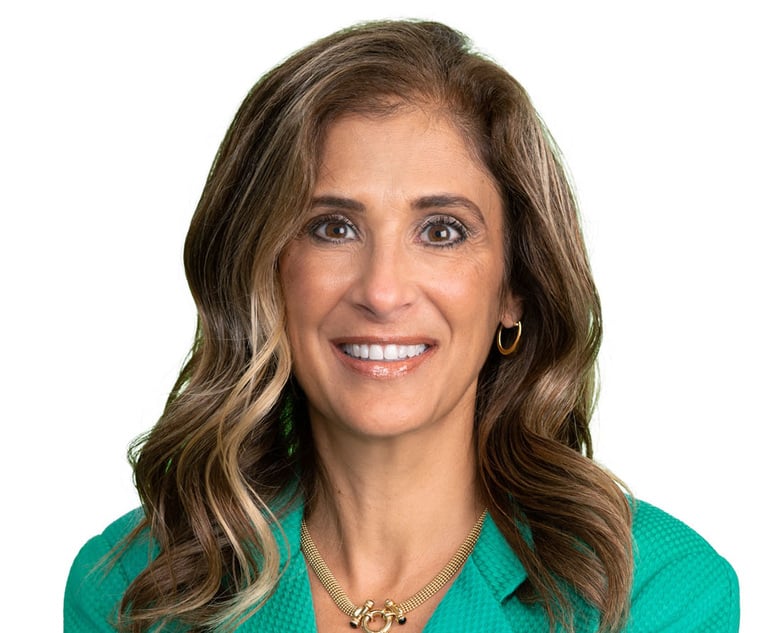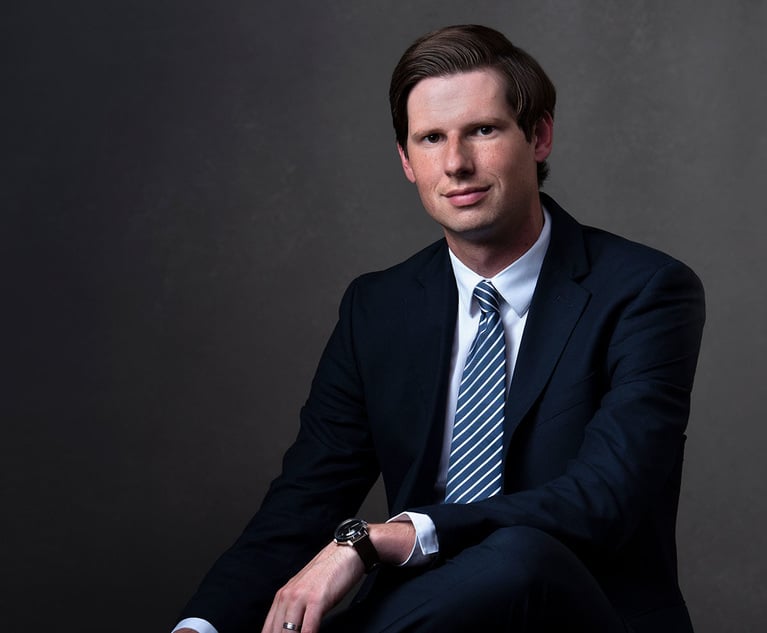Krasner Sees Staffing Levels as Major Hurdle in Wake of First 100 Days as DA
Philadelphia District Attorney Larry Krasner has implemented sweeping changes during his first 100 days in office, but, according to the city's top prosecutor, one of the biggest hurdles the office faces now is a shortage of line prosecutors to execute all the new policies.
April 11, 2018 at 05:38 PM
9 minute read
 Larry Krasner.
Larry Krasner. Philadelphia District Attorney Larry Krasner has implemented sweeping changes during his first 100 days in office, but, according to the city's top prosecutor, one of the biggest hurdles the office faces now is a shortage of line prosecutors to execute all the new policies.
Krasner was inaugurated as the district attorney of Philadelphia on Jan. 2, and since that time he has stopped seeking cash bail for low-level offenses, told prosecutors to incorporate the cost of incarceration into their sentencing recommendations, hired an immigration attorney to advise the office about how certain charges might affect a defendant's immigration status, and outlined new policies aimed at combating mass incarceration, including offering plea deals with shorter prison sentences and declining to pursue certain criminal charges.
Over the same 100 days, his office has seen equally sweeping staff changes, including losing dozens of attorneys, which have left many line prosecutors to take on increasingly large caseloads.
During an interview Wednesday, Krasner said “the pipeline [for bringing in new attorneys] is very strong,” but timing and market pressures have led to delays in getting staffing levels as high as they had been before he took office.
“We've been on a very vigorous mission to hire mid-career people,” Krasner said. “We have well over 500 resumes from all over the country.”
Because the push to bring more people into the office began during the middle of the typical hiring cycle for recent law school graduates, and the efforts come at a time when the legal market is experiencing one of the best times for attorneys in the past decade, there have been some delays, Krasner said.
“This is a geographically, religiously, ethnically, racially, intellectually diverse and talented bunch of people. It's a big pipeline and we should have no problem filling, or overfilling the shoes, but because of the timing, there's a necessary delay,” Krasner said.
Some hires, however, are already in the works. Krasner noted Wednesday that five were hired last week, and, according to office spokesman Ben Waxman, as many as 14 hires are in the works. But, given that some of the attorneys are midway through their career, they have families, so the moves are not happening as quickly.
Turnover Tide
Personnel changes have been a hallmark of the early days of Krasner's tenure in office.
Three days after he was sworn in, he asked more than 30 veteran prosecutors to resign. The mass exodus, on a snowy Friday, sent shock waves throughout the legal community, disrupted some court proceedings, and, according to several sources, cast a pall over the line prosecutors who had served in the previous administration.
Some staffing challenges, Krasner said, related to the fact that some employees' attitudes were “fundamentally inconsistent with the mission of the office,” and although many were asked to leave, others had been leaving on their own.
Market conditions for attorneys have factored in as well, he said.
“We've seen a lot of attorneys, sometimes midcareer, who are very much in agreement with the mission, but they're also very much in agreement with getting another $50,000,” he said, adding that the previous administration did little to raise the salaries of line prosecutors.
According to city payroll records surveyed by the website City & State Pennsylvania, more than 80 staffers—lawyers and nonlawyers—have left the office since November.
Several attorneys who recently left the office described a divide between lawyers who have recently joined the office and those who have worked at the office for years. Sources said that supervisors have made charging decisions or plea deals without much input from the handling ADA, and that more seasoned prosecutors are afraid to voice their concerns about implementing the policy changes for fear that they will be asked to resign.
One source who is familiar with the office gave the example of the office's policy of not charging low-level marijuana offenses. The source said implementing the policy raised a variety of issues, including whether charges should be dropped in cases where marijuana is the basis for a DUI charge, or when marijuana was the initial reason for a search that turned up other contraband, like an unlicensed firearm. Getting answers to the questions was difficult, the source said, because “there's no organizational structure.”
“No one knows who they're answering to,” the source said. “We have no idea whose direction to follow.”
The source, however, also said Robert Listenbee, who was brought in as the office's second first assistant in February, has been “fantastic.”
“He's the silver lining,” the source said.
Krasner dismissed the claim that the office lacked organizational structure as “ridiculous.”
“I understand people may not agree with it, or it may be disorienting to see change,” he said. “But that's ridiculous. There's a specific chain of command laid out in detail.”
'Growing Pains'
The sweeping policy and staffing changes have earned Krasner praise from some and scorn from others.
John Pfaff, a professor at Fordham University School of Law, who was also a member of Krasner's transition team, said he has been impressed with the administration so far.
“It's been a fairly ambitious agenda, but at the same time that's why the people in Philadelphia voted for him,” Pfaff said. “There's nothing he's done that he didn't talk about while campaigning.”
Pfaff said it is too early to tell whether the changes will ultimately be successful, especially in light of potential pushback, but he said sending the message that prosecutors can help lead criminal justice reform efforts is an important message to send.
“I've been impressed with his willingness to roll out fairly aggressive reforms early in his administration,” Pfaff said. “I'm excited to see where it's going to go.”
Stanford Law School professor George Fisher, who previously worked as a prosecutor in Massachusetts, said the cash bail initiatives may need to be revisited if problems arise, and he was skeptical about having attorneys raise the cost of incarceration issue, since fixed costs of running a prison make it difficult to argue that a year of incarceration will cost taxpayers a certain amount. However, by and large, he said the administration's efforts were admirable.
“It seems this is a man who's determined to carve a new path, and admirably so. He's looking hard at old practices and questioning them, taking the initiative to correct old mistakes. That's all to be commended, and may indeed change the temperature and conversation around the criminal justice system,” he said. “The system's been getting a really bad rap for the past few years, and having a district attorney out in front trying to reform it is all for the good.”
Along with the praise, Krasner's administration has received significant criticism for failing to keep some victims appraised of changes in their cases, and some of the new policies have faced pushback from the bench.
Some of Krasner's harshest critics, however, are those most familiar with the office—former prosecutors.
Richard Sax, a former homicide prosecutor, who retired last April, said the office is experiencing a severe “brain-drain.”
“The best and the brightest and the ones with the largest database of information relative to what's fair and what comprises equal justice are gone, or are leaving,” Sax said. “It's horrific.”
Members of the defense bar say they are excited, and described the pushback the office has experienced as “growing pains”—a phrase that Krasner himself has used to describe the hurdles the office has faced.
“I think it's a positive change,” defense attorney Chris Montoya of Montoya Coleman said. “Larry is keeping his word.”
Montoya and other defense attorneys have said some ADAs appear overworked under their increased caseloads, but, he added that the new prosecutors have been easier to work with. The new policy encouraging lesser plea deals may also help eliminate some of the backlog, Montoya said, and he further lauded the efforts to send more cases to diversion programs.
Not all defense attorneys, however, are feeling the effects of the Krasner administration.
Charles Gibbs of McMonagle Perri McHugh Mischak Davis, who is president of the Barristers' Association, said that, although there appears to be a “potential for change,” in practice not much has changed in the past 100 days for defense attorneys.
“There's been some change at the homicide level, but in the average, municipal court, felony track cases, I can't say there's a huge difference,” Gibbs said. “Change is always difficult, but quite frankly, I have not seen much change yet.”
When asked what grade he might give Krasner's administration for its first 100 days, Gibbs said, given the fallout from the first mass exodus, reports of low morale among the experienced DAs, and the office's missteps in dealing with victims' families, he would give the administration a “C,” which, Gibbs noted, is average, but allows for progress.
On Wednesday, Krasner said the administration has faced some hurdles when it comes to staffing and the office's relationship with victims. However, he noted that the office recently launched a crime victim advisory committee to give victims more of a voice within the administration.
“We have to do better as we change the relationship,” Krasner said. “We have to make sure people don't get missed, and don't fall through the cracks.”
In terms of successes, Krasner cited many of the policy advisers who have joined his administration, and said his two first assistants have been a “coup” for the office. The biggest successes, he said, are the various policy changes aimed at curbing mass incarceration, which he said have led to a reduction in the prison population at a time when crime is also falling in the city.
Krasner's focus now is to secure more attorneys to execute the policies.
This content has been archived. It is available through our partners, LexisNexis® and Bloomberg Law.
To view this content, please continue to their sites.
Not a Lexis Subscriber?
Subscribe Now
Not a Bloomberg Law Subscriber?
Subscribe Now
NOT FOR REPRINT
© 2025 ALM Global, LLC, All Rights Reserved. Request academic re-use from www.copyright.com. All other uses, submit a request to [email protected]. For more information visit Asset & Logo Licensing.
You Might Like
View All
People in the News—Jan. 23, 2025—Marshall Dennehey, Duane Morris, Hangley Aronchick
3 minute read
Plaintiff Argues Jury's $22M Punitive Damages Finding Undermines J&J's Talc Trial Win
4 minute read
Pa. High Court: Concrete Proof Not Needed to Weigh Grounds for Preliminary Injunction Order
4 minute read
Trending Stories
- 15th Circuit Considers Challenge to Louisiana's Ten Commandments Law
- 2Crocs Accused of Padding Revenue With Channel-Stuffing HEYDUDE Shoes
- 3E-discovery Practitioners Are Racing to Adapt to Social Media’s Evolving Landscape
- 4The Law Firm Disrupted: For Office Policies, Big Law Has Its Ear to the Market, Not to Trump
- 5FTC Finalizes Child Online Privacy Rule Updates, But Ferguson Eyes Further Changes
Who Got The Work
J. Brugh Lower of Gibbons has entered an appearance for industrial equipment supplier Devco Corporation in a pending trademark infringement lawsuit. The suit, accusing the defendant of selling knock-off Graco products, was filed Dec. 18 in New Jersey District Court by Rivkin Radler on behalf of Graco Inc. and Graco Minnesota. The case, assigned to U.S. District Judge Zahid N. Quraishi, is 3:24-cv-11294, Graco Inc. et al v. Devco Corporation.
Who Got The Work
Rebecca Maller-Stein and Kent A. Yalowitz of Arnold & Porter Kaye Scholer have entered their appearances for Hanaco Venture Capital and its executives, Lior Prosor and David Frankel, in a pending securities lawsuit. The action, filed on Dec. 24 in New York Southern District Court by Zell, Aron & Co. on behalf of Goldeneye Advisors, accuses the defendants of negligently and fraudulently managing the plaintiff's $1 million investment. The case, assigned to U.S. District Judge Vernon S. Broderick, is 1:24-cv-09918, Goldeneye Advisors, LLC v. Hanaco Venture Capital, Ltd. et al.
Who Got The Work
Attorneys from A&O Shearman has stepped in as defense counsel for Toronto-Dominion Bank and other defendants in a pending securities class action. The suit, filed Dec. 11 in New York Southern District Court by Bleichmar Fonti & Auld, accuses the defendants of concealing the bank's 'pervasive' deficiencies in regards to its compliance with the Bank Secrecy Act and the quality of its anti-money laundering controls. The case, assigned to U.S. District Judge Arun Subramanian, is 1:24-cv-09445, Gonzalez v. The Toronto-Dominion Bank et al.
Who Got The Work
Crown Castle International, a Pennsylvania company providing shared communications infrastructure, has turned to Luke D. Wolf of Gordon Rees Scully Mansukhani to fend off a pending breach-of-contract lawsuit. The court action, filed Nov. 25 in Michigan Eastern District Court by Hooper Hathaway PC on behalf of The Town Residences LLC, accuses Crown Castle of failing to transfer approximately $30,000 in utility payments from T-Mobile in breach of a roof-top lease and assignment agreement. The case, assigned to U.S. District Judge Susan K. Declercq, is 2:24-cv-13131, The Town Residences LLC v. T-Mobile US, Inc. et al.
Who Got The Work
Wilfred P. Coronato and Daniel M. Schwartz of McCarter & English have stepped in as defense counsel to Electrolux Home Products Inc. in a pending product liability lawsuit. The court action, filed Nov. 26 in New York Eastern District Court by Poulos Lopiccolo PC and Nagel Rice LLP on behalf of David Stern, alleges that the defendant's refrigerators’ drawers and shelving repeatedly break and fall apart within months after purchase. The case, assigned to U.S. District Judge Joan M. Azrack, is 2:24-cv-08204, Stern v. Electrolux Home Products, Inc.
Featured Firms
Law Offices of Gary Martin Hays & Associates, P.C.
(470) 294-1674
Law Offices of Mark E. Salomone
(857) 444-6468
Smith & Hassler
(713) 739-1250





